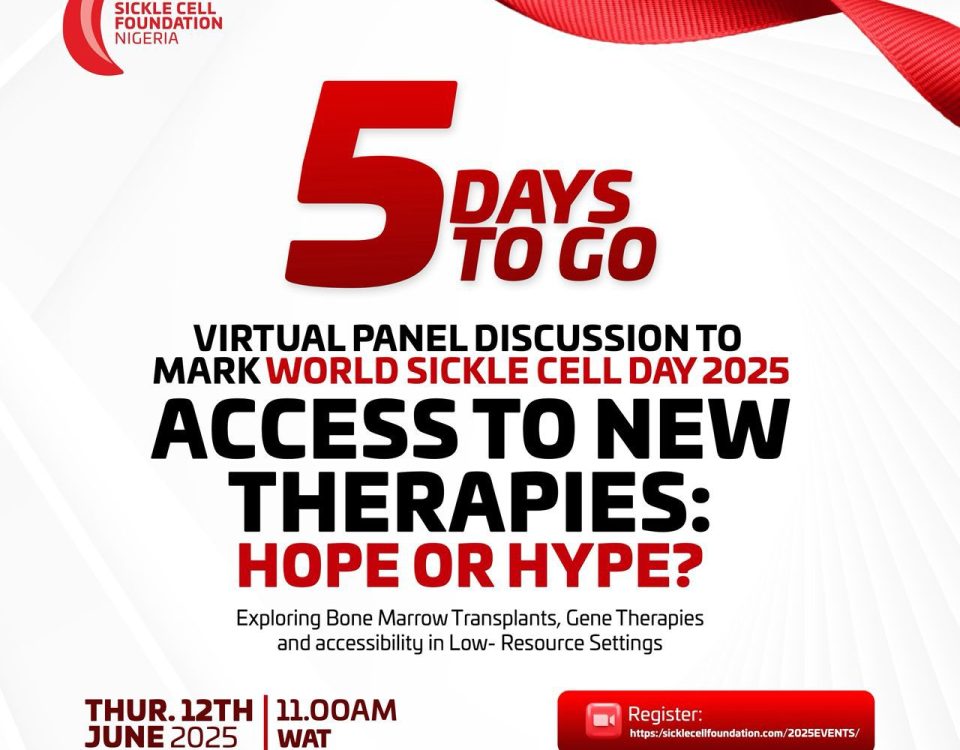A CHAT WITH OSAMEDE KIKI OGIUGO

Modern Science has enabled persons with SCD to Live Long & Work Well
January 17, 2022
The Importance of Nutrition in the Management of SCD
June 16, 2023
SCB: Please introduce yourself to our readers.Kiki: Thank you for this opportunity, I am delighted to be a part of this Bulletin and pleased to share my experience. My name is Osamede Kiki Ogiugo, I am a Project Manager and the Creative Director of Kikirewastylez. Most importantly, I am an enthusiast and a believer in love for humanity. That simply means I am deeply passionate about making a positive impact on the world especially through raising awareness, providing support, and advocating for individuals and families affected by the sickle cell disorder
Kikirewastylez. What is that?
Kiki: Kikirewastylez is a Nigerian brand fashion designing and training outfit located in Lekki, Lagos.SCB: Okay. Please tell us more about your family. How many siblings do you have?
Kiki: I am the fourth child of a family of five. We used to be 6, 3 boys and 3 girls, but we lost one of my older brothers to sickle cell anaemia.
SCB: What is your relationship with the person with the sickle cell disorder?
Kiki: Esosa is my immediate younger sister.
SCB: When and how did you learn about her Hb SS status?
Kiki: We got to know about her SS status when she was less than a year old. My parents noticed she was always crying, very cranky, and showed signs of discomfort. Having had a previous experience with my older brother, my parents decided to check her genotype status, then they got the heartbreaking confirmation of what they feared the most.
SCB: What was the reaction of the family?
Kiki: like I earlier stated, we were all heartbroken as she was just a baby. She did not deserve to experience such suffering SS brings. We were all quite sad, disappointed, and devastated
N SCB: Before you were told by your parents about your sister’s SS status, did you notice anything unusual about her?
Kiki: I was a child myself, as our age difference is just 6 years. But I got to know that she always seemed to cry for no obvious reason.
SCB: How many of you have the sickle cell disorder in the family?
Kiki: My late brother and Esosa.
SCB: How did your sister’s ill health impact the family?
Kiki: It was a huge blow both psychologically and financially. Especially because we already had one. Sickle cell disease often requires ongoing medical care, which can be expensive. My family has faced huge financial strains due to medical bills, medications, and frequent hospital visits. This affected my family’s overall financial stability and limited resources available for other needs.
My dad, bless his soul, was very loving and supportive. He stood strong and did his best to support both children during his lifetime. My mum on the other hand I think is the strongest woman I know! Mrs Margareth Ogiugo. That woman has been through a lot having had to deal with two children living with sickle cell disorder.
SCB: Can you recall any moment when important family activities or events were interrupted because of this?
Kiki:
On several occasions, my parents had had to cancel events as a result of crises. My siblings’ health condition restricted their participation in several social activities and events. As a result, they had to miss out on some activities or modify plans to accommodate their needs. That sometimes led to feelings of isolation or frustration.
SCB: As a child, how did this make you feel?
Kiki: Having siblings with sickle cell had various impacts on my life. For instance, experiencing a range of emotions, including worry, fear, and sadness, seeing your siblings go through pain and health complications. It is not just emotionally challenging to witness their suffering; one is, at times, overcome by a feeling of helplessness. There was also increased responsibility as I had to take on additional responsibilities such as helping with daily care, assisting with medication management, or accompanying them to medical appointments and admissions. This made me to mature quickly and take on a caregiving role at a young age.
However, it has helped me to become more knowledgeable about the disease, its symptoms, and treatment options. I have also developed a better understanding of healthcare systems and how to advocate for the needs of those affected by sickle cell. It have also developed a deeper empathy and compassion for others. Most importantly, it has created a stronger bond between me and my sister.
SCB: Undoubtedly, she must have experienced some challenges as a result of the disorder. How well do you think she has coped and is coping with them?
Kiki: It’s not been easy for her to have a routine life. She has now grown into a very strong woman. Now, it’s easy for her to maintain a healthy lifestyle by herself. She has had challenges of stigmatization, discrimination, and restricted physical activity so as to avoid the risk of triggering a sickle cell crisis. This has impacted her ability to participate in sports, exercise, or engage in certain physical activities but she has been handling it very well. Currently, she teaches in a school and is doing well for herself
SCB: What has been your role in helping her to cope with those challenges?
Kiki: Being her immediate older sister, she sees me as a role model. I am always ready and happy to support her emotionally, for instance, offering a listening ear and a shoulder to lean on. Understanding that she sometimes experiences pain, frustration, or sadness due to her condition, I also try to provide empathy and reassurance.
Most importantly I have had to educate myself about the condition to better understand her needs and challenges.
SCB: Were there times when you felt weighed down by this burden of coping with an affected sibling? Your response may help other siblings going through a similar experience feel that they are not alone.
Kiki: Hmmm. A lot of times! Well, I’ll say, mostly, I was scared of losing her. Some crises are so excruciating you would think she wouldn’t survive it. But to the Glory of God she’s been pulling through and coming out stronger.
SCB: Can you give examples of the sort of discrimination/stigmatization that your sister faced either within the family or at school?
Kiki: This mostly occurred at school especially as she had stunted growth and a bad leg. This made a lot of people misjudge her age and probably disrespect her
SCB: You have told us that you have always been very close to your sister. How did your other siblings interact with your sister?
Kiki: She is very much loved by all as she is the last born of the house.
SCB: As children, what did you and your sister enjoy doing together (fun activities)?
Kiki: We loved playing House. lol
That was one of the most stress-free fun activities that we could do together.
SCB: How has having an affected sibling shaped your own life?
Kiki: It has taught me how to be empathetic, expressive and to appreciate life even more.
SCB: Do you think siblings would benefit from a counselling service because of the burden on the entire family?
Kiki: Oh yes. Counselling will be a good idea as that will help siblings to understand and accept the condition.
SCB: Great! What advice would you give to other affected persons?
Kiki: Educate yourself: learn as much as you can about sickle cell disease, including its symptoms, triggers, and treatment options. Understanding your condition will empower you to make informed decisions about your health. Stay positive and seek emotional support. Surround yourself with a supportive network of family, friends, and mental health professionals who can provide emotional support and help you maintain a positive outlook. Remember, everyone’s experience with sickle cell disease is unique, so it’s important to work closely with your healthcare team to develop a personalized plan that meets your specific needs.
I encourage those affected to live their best lives, without letting the disorder limit them. They should prioritize a healthy lifestyle.
SCB: What advice can you give to other people living with someone with the disorder?
Kiki: Love is the greatest support you can give a child or sibling who has sickle cell anaemia. The Sickle Cell Disorder is not a death sentence. The best you can do for such people is to support them in every way necessary, love them, and help them to live the best of their lives. Support their aspirations and goals: encourage your sibling to pursue their dreams and goals, despite the challenges they may face due to their condition. Offer support and encouragement and help them find resources or opportunities that align with their interests.
Very importantly, remember to take care of yourself as well. Supporting a sibling with sickle cell disease can be emotionally and physically demanding, so make sure to seek support from friends, family, or support groups to help you navigate your feelings and challenges.
SCB: What, in your opinion, should the Government be doing to lighten the burden of people with sickle cell disorder?
Kiki: I think the Government can support them by providing free or subsidized supplements, creating enough awareness and funding research. Additionally, the Government can provide scholarships for qualified candidates living with the sickle cell disorder because a lot of affected persons have financial challenges and are unable to further their education if they are from poor families.




